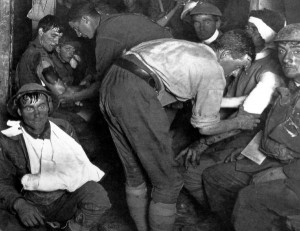
In the history of medicine, it’s a rather morbid fact that war often leads to great medical breakthroughs – as the weapons of war change, doctors must innovate in order to meet these new challenges.
When the First World War started 100 years ago today, the British Expeditionary Force (BEF) setting out for France envisaged an entirely different war to the one with which they were faced. Trench warfare was a new concept, the use of gas was almost unknown, and this war would involve mechanized weaponry on a scale never before seen.
A new condition
Within months, some of the highly-trained BEF soldiers started to experience intense panic and fear accompanied by physical symptoms such as an inability to speak or walk. While those in this conflict were not the first to feel the intense stress of war, and the trauma of what they saw on the battlefield, the symptoms emerged in so many soldiers, and were so consistent, that the syndrome was given a name: ‘Shell shock’. Doctors had to innovate their methods to treat this new disease, and by the end of the war 80,000 soldiers had received treatment for the condition.
A key challenge was understanding the causes of the disease. Many cases developed after a particularly heavy bombardment, and doctors at first thought it was due to whether it was the physical shock and noise of the explosions – hence its name. However, a psychological explanation later emerged linking the condition to the intensity of trench warfare, and near-constant stress. Whether a soldier’s shell-shock was ascribed to physical or psychological causes, or even assigned as cowardice, could drastically affect the type of treatment they got, from punishment, to electro-shock therapy, to an assigned period of rest.
Treatment for soldiers today
As ever, the weapons of war are evolving, and so are our approaches to treatment. Post-Traumatic Stress Disorder (PTSD) is a term applied to those experiencing psychological trauma in conflict, but also from a range of other types of physical and emotional trauma, so that lessons learned from treating psychological harm from one cause can be applied across the board. On the NHS Choices page about PTSD, you can see a list of the various causes, with military combat listed alongside other causes like experiencing natural disasters or domestic abuse.

Recognition for the range of psychological effects of war are receiving more recognition, and the BioMed Central journal Military Medical Research publishes articles about psychological disorders alongside studies of more typical combat injuries. Military psychologists often talk about ‘suffering while functioning’ – having symptoms of a psychological disorder while still being able to work, and are researching prevention and treatment options before soldiers reach complete breakdown.
A study of sleep disorder among Chinese soldiers showed that soldiers experiencing high levels of stress are vulnerable to lack of sleep and that this can have a very real effect on their ability to carry out their duties. But crucially, they found that soldiers who had rated as having high levels of social support were less likely to have sleep problems.
Impacts beyond the military
The psychological stress of war upon those not on the battlefield is getting a lot more attention too, with a number of international organisations highlighting sexual violence in areas of conflict, and working to help people recover from the psychological trauma it causes. The effects of sexual violence permeate far beyond areas of conflict, as a study of Syrian refugees in Lebanon showed. 30% of women had experienced conflict-related violence, but the survey also showed an elevated level of intimate partner violence among families fleeing the conflict. Unsurprisingly, the women who had experienced sexual violence showed high levels of stress, and the authors suggested that this might have contributed to some of the health issues they reported.
It is also well documented that children in areas of conflict experience a high rate of psychological issues, and an article in BMC Medicine has even hypothesized several different mechanisms by which conflict might affect children that haven’t even been born. They suggest potential mechanisms, and look to evidence that the stress of conflict during pregnancy can have similar impact on birth weight to malnutrition during pregnancy.
Their final conclusion is a really hopeful one about the power of research and evidence to make a difference in the way humans behave. They suggest that more research should be done to measure the impacts of conflict upon future generations, hoping that the weight of evidence about the full costs might help prevent the decision to go to war in the first place.
Well, well. What a lengthy comment on the inevitable breakdown of some people under stress. So combat is the opposite of the survival of the fittest, i.e. those who chicken out survive nicely as “combat casualties” while those who take all the risks and suffer death and wounds carry the load. And “military psychologists” have a field day developing crappy theories to rationalize plain, old-fashioned cowardice. Next in line for the jerks who perpetrate this pseudo medical science will be recommendations for Purple Hearts for the gutless.